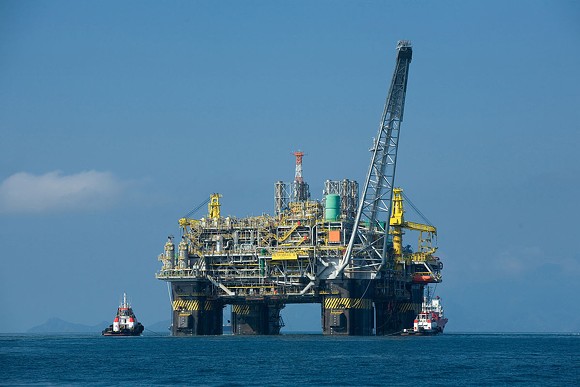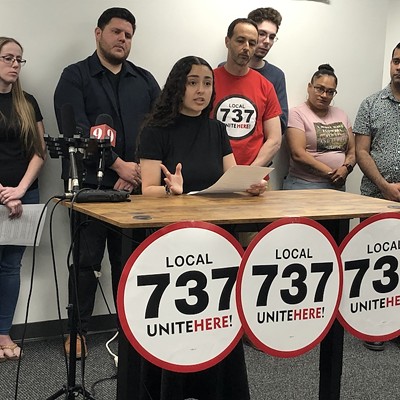Editor's note: The report discussed in this post was referring to drilling in federal waters, not state-owned. Federal waters begin three nautical miles (about three and a a half "land miles") offshore. Such oil drilling, though not in state waters as the reporter originally wrote, would still affect Florida in the ways he described. The Deepwater Horizon spill, though it's an extreme example, took place 41 miles off the Louisiana shore. We have appended Florida Petroleum Council executive director David Mica's response to the end of this post.
Here we go again: The Florida Petroleum Council is already renewing its push for offshore drilling
In the industry's (convenient) opinion, the Sunshine State stands to gain as much as $2.5 billion in revenue as a result of offshore leasing in the Atlantic Outer Continental Shelf and the Eastern Gulf of Mexico.
"The projected tax revenues outlined in this new study of potential federal offshore oil and natural gas production and activity could mean substantial investments in Florida … in areas like education and opportunities to rebuild infrastructure," FPC executive director David Mica said in the study.
Mica added: "This opportunity to inject $1 billion in increased state and local revenues, coupled with the additional billions of dollars for the economies of coastal states from previous studies, is critical for any plans to help improve quality of life for Florida's residents and the overall future of the state."
The new report's title – The Economic Impacts of Allowing Access to the Atlantic OCS and Eastern Gulf of Mexico for Oil and Natural Gas Exploration and Development Supplement – is a mouthful. Researchers behind the study suggest offshore drilling exploration "could generate additional non-bonus and royalty revenue such as personal and corporate income tax, property tax and sales tax. The combined associated state and local tax revenues are projected to reach nearly $155 million annually by the end of the forecast periods, according to the report."
That's a lot of rewards, according to folks who stand to make a ridiculous amount of money with the renewal of offshore drilling in Florida waters.
But what about the risks – the factors the authors and researchers behind the study so casually omit?
In 2015, five years removed from the Deepwater Horizon disaster tainting the Panhandle's flour-like beaches, petroleum heavy-hand BP agreed to an $18.7 billion settlement with the state, as well as four other Gulf states and the federal government. Of that hefty amount, Florida scored an estimated $3.25 billion, roughly $2 billion of which was for the state's economic losses, particularly in the tourism and seafood sectors.
Throughout the disaster, scientists estimate 184 million gallons of oil were spilled, which resulted in more than 73,000 pounds of oil residue collecting on Florida's beaches. A horrifying amount, yes – however, Florida wasn't even the Gulf state hit the hardest; Louisiana was.
Here are more facts: At the moment, assuming Republican Gov.-elect Ron DeSantis doesn't go back on his promise to keep drilling out of Florida waters, oil represents only a tiny portion of Florida's economic activity, according to the Natural Resources Defense Council. And because it only produces a small fraction of the country's crude oil and natural gas output, the U.S. Energy Information Administration ranks Florida 22nd of 31 states in total crude oil production. That means we contribute less than 0.0006, or one-sixteenth of 1 percent, of U.S oil production.
And as for the economic incentives the study's authors promise? Florida's economy – not to mention the U.S. economy as a whole – isn't doing too bad in the first place; it topped $1 trillion for the first time in July. That means if the Sunshine State were its own sovereign nation (don't get any crazy ideas, y'all), it would have the 17th-largest economy in the world, ahead of countries such as Switzerland, Saudi Arabia, Argentina and the Netherlands. Not bad, in other words.
So sure, there's money to gain, just as there's money to gain at the state level from, say, legalizing and regulating the sale of recreational cannabis. But in light of the facts – and for the sake of history not repeating itself – and oh yeah, the will of the voters – let's just back away from this rosy-spectacled report.
Your article criticizing a report detailing the economic benefits that offshore energy exploration could bring to Florida has one glaring error and a few less obvious ones. The glaring error: The report focuses on the financial benefits of energy development in federal waters, not state waters, as you claim.
But you do get one thing half right. Someone does indeed “stand to make a ridiculous amount of money with the renewal of offshore drilling in Florida waters.” Do you know who? Floridians. In a nutshell, Florida could gain 60,000 in-state jobs per year and $2.5 billion in state and local tax revenues through energy development on the Outer Continental Shelf, which, again, is located well off the coast in federally controlled land.
Offshore operations are safer today than ever before. Industry experts have worked closely with government regulators to improve safety through technological advances and best practices – creating or strengthening more than 100 safety standards since 2010.
Floridians can agree that protecting our beautiful coastline is the top priority. Many of us also recognize that we can create jobs and boost funding for roads and schools by safely developing our offshore oil and natural gas resources.
David Mica
Executive Director
Florida Petroleum Council
Stay on top of Orlando news and views. Sign up for our weekly Headlines newsletter.


















